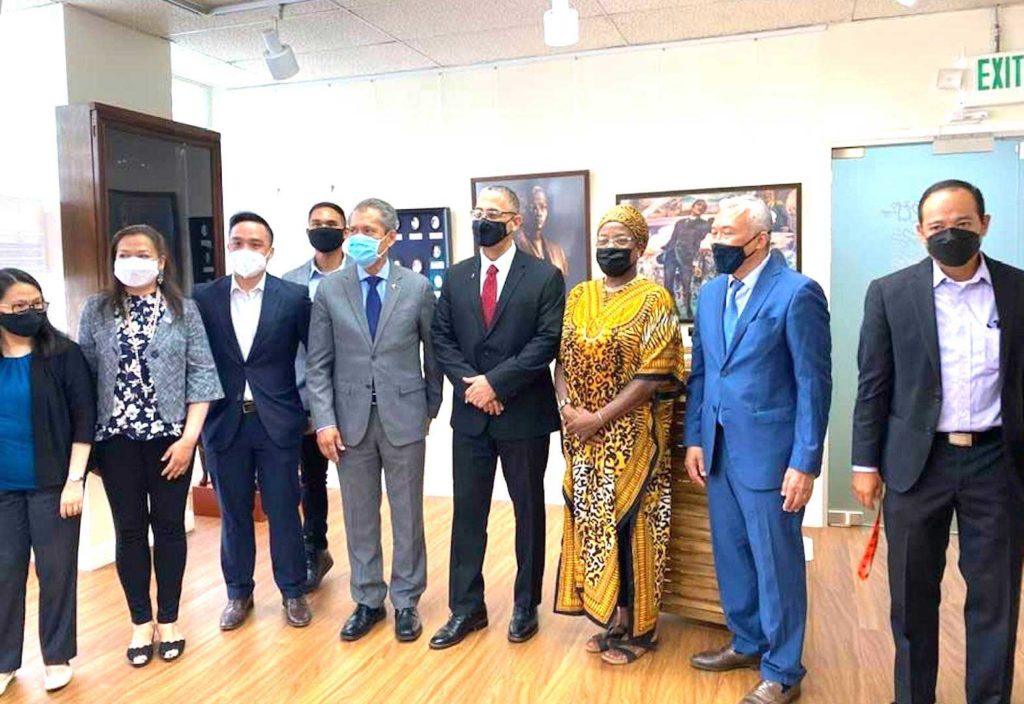SF Fil-Am Chamber hosts business leaders Karl and Brenda Cureton

San Francisco Fil-Am Chamber of Commerce members with Consul General Ferrer (fifth from left) Karl and Brenda Cureton (sixth and seventh from left). CONTRIBUTED
SAN FRANCISCO – With small businesses getting the brunt of the lockdowns, many being pushed to the edge of bankruptcy, the San Francisco Filipino American Chamber of Commerce (SFFACC) recently hosted Karl Cureton and his wife, Brenda, both business leaders, who shared helpful tips on navigating government opportunities for minority businesses.
Karl Cureton is founder and executive chairman of the Council Exchange Board of Trade (CEBOT), a 501c6 non-stock trade association that represent over 65,000 minority technology employers located in 40 districts across the U.S., with an industry aggregated annual sales of over $100 billion.
Cureton is also fund manager of the Community Outcome Fund in applied research, a program that helped establish with the federal government. Brenda Cureton, MPA, is president of CEBOT and of the Virginia Career Education Foundation. She leads a team of university, industry and government data scientists, privacy and enterprise specialist engaged in developing an Internal Review Board for submission to the U.S. Department of Health and Human Services.
CEBOT was formerly known as Minority Technology Council, which promoted the value of teaming, joint ventures, partnerships and potential mergers and acquisitions. CEBOT has expanded its thrust to include other industries, with stakeholders serving as advisors lending network and expertise to organizations such trade groups like the Chamber of Commerce.
Karl Cureton explained that CEBOT relates to the government but not in a paid capacity. It provides expert advice regarding industry trends and is not aligned with any political party or administration. Its focus is on how to leverage laws for the minority industries and ecosystems they serve.
Its core principle according to Atty. Cris Ibarra, a senior fellow at CEBOT, is integrity and love. Cureton founded the organization some 24 years ago with proven track record recognized by the federal government and private industries. “Quaintly Utopian,” most of CEBOT’s initiatives and programs almost always have an underlying benefit to underserved and minority businesses.
Ibarra, also a SFFACC board director and legal counsel, Ibarra said t CEBOT plays a key role in pooling resources to strengthen minority innovation through public/private partnerships and inclusive procurement solutions.
These partnerships include the development of the nation’s first industry-led opportunity fund. He added that “CEBOT is included in the U.S. Department of Commerce, Minority Business Enterprise Technology Transfer Innovation Consortium, as a regional ecosystem innovation stakeholder partner both to support minority technology businesses and promote the advancement of STEM–Science, Technology, Engineering and Math.”
Karl Cureton spoke of getting the Filipino American and other minority communities, to consider collaboration through the Small Business Administration, on social equity development. He also said that CEBOT is “looking at collaboration as a risk mitigator, that’s what we can be as an intermediary to bring entities together that are disparate at this point, as we bring folks together, that’s really the currency that we should be focused on in our relationships.”
Cureton further expounded:
“What I see as a direct opportunity within the partnership, is for CEBOT, to be on the ground in San Francisco. One of the key areas that I believe we need to do as people of color is to be able to coordinate and to collaborate with each other. Our access to the federal government is valuable, yes. But what’s even more valuable are the relationships, the long-term, established relationships that the chambers, this specific chamber, has already developed. I mean, over 50 years, you can hear the legacy of relationships coming in. You’ve got a new board. All of that is something that CEBOT can leverage when we bring our growth algorithm’s, our knowledge, our research to the table. But what you bring is the relationships.”
Jose Pecho, chairman of SFFACC agreed. “In a nutshell, the intent of SFFACC to collaborate and knowledge share with CEBOT, is the opportunity to create initiatives and programs and have access to CEBOT’s diverse network of federal agencies in pursuit of funding and aid programs to help accelerate the sustainable development of minority business enterprises.”
CEBOT members include major industries, chambers of commerce, certified technology companies, government agencies, universities, non-profits and k-12 educational institutions. One need to apply at CEBOT’s website to become a member.
The CEBOT team as described by Ibarra is comprised of professionals with different skills, who’ve submitted research papers that the federal government has approved and implements, in fields of science and technology.
Ibarra proudly shared that “the team has co-developed with RSA Archer GRC is the e-GRC software system, a platform that serves as an aggregation point for consolidation of governance, risk and compliance information of any type.” The Platform allows seamless integration of data systems without requiring additional software.
Other CEBOT thrusts are telecom broadband, designed to apply across the US, and other nations in the long haul.
Prior to the luncheon presentation, held at the Kalayaan Hall of the Philippine Consulate General in San Francisco, the first event at the hall after a year and a half of lockdown due to the pandemic; the Curetons together with Chamber officers, made a courtesy call on Consul General Neil Ferrer and discussed possible partnerships with Philippine government agencies and CEBOT.

